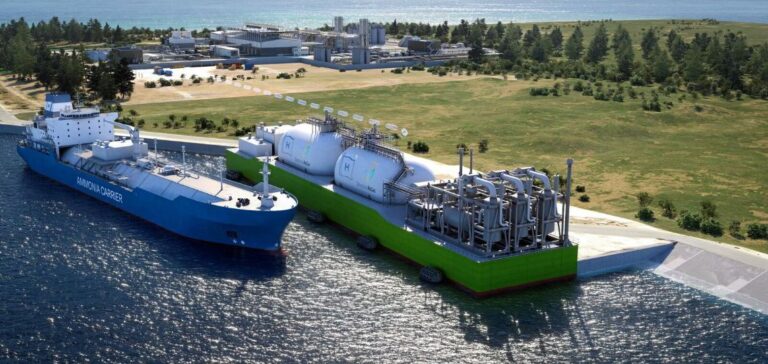Höegh Evi, a major player in marine energy infrastructure solutions, has signed a memorandum of understanding with the port of Port-La Nouvelle to develop a floating terminal for hydrogen imports. This initiative aims to make Port-La Nouvelle a strategic center for hydrogen in Europe, meeting the continent’s growing demand for clean energy.
The port, located in the Occitanie region, has made significant investments in recent years to modernize and prepare its facilities for the new needs of green energy. This collaboration with Höegh Evi will not only boost the local economy but also enhance the industrial and energy attractiveness of the region.
Infrastructure Objectives
The floating terminal, designed to receive large quantities of hydrogen, will be able to import up to 210,000 tons per year by 2030. This project, in connection with European hydrogen transport infrastructures, will help secure Europe’s energy supply. By linking this floating platform to hydrogen transport networks, the port of Port-La Nouvelle aims to establish itself as a primary entry point for clean molecules.
Strategic Partnerships
The project is supported by European stakeholders such as HySoW Hydrogen and the gas network operator Teréga, who will contribute to the integration of this new infrastructure within the European hydrogen transport network. Collaboration with these partners will optimize the delivery of hydrogen from the port to the industrial and urban areas most in need, while supporting Europe’s efforts to reduce its carbon emissions.
Prospects for Energy Transition
For Höegh Evi, this project represents a major step forward in its strategy of promoting renewable energy in Europe. According to Erik Nyheim, President and CEO of Höegh Evi, the terminal will actively contribute to Europe’s energy transition by facilitating access to low-carbon fuels.
At the same time, Hans Kerstens, CEO of SEMOP Port-La Nouvelle, expressed the port’s ambition to evolve into a central role in the importation of renewable fuels. “We look forward to transforming Port-La Nouvelle into Europe’s Mediterranean hydrogen hub,” he said, underscoring the port’s commitment to the green energy sector.
Challenges and Timeline
The realization of this floating terminal depends on several feasibility and design studies that will be conducted in the coming months. The commissioning of this facility will also depend on the progress of hydrogen transport infrastructure in France, scheduled for 2030. This project represents a significant technical and logistical challenge, but also an opportunity to accelerate the adoption of hydrogen as an alternative energy source in Europe.






















